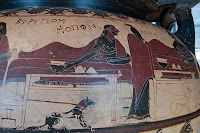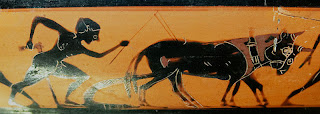Wonderful, funny NPR article on the Iliad vs. Adele Geras' young adult novel Troy:
The Iliad is probably a better poem for never describing the size of Helen's breasts or the exact shade of Paris' hair (a "spun gold," if you believe Geras). But there is something immensely satisfying about the unabashed sentimentalism and lush prose of Geras's Troy after the cryptic sparsity of the original, in which the city falls only by implication, when its hero, Hector, dies. We never see it go down, which is both masterful and frustrating. But Troy provides us with flames, destruction and trysts among the ruins.
The novel follows various Trojan women during the siege and destruction of the city and features several love triangles, an unwanted pregnancy, and sometimes shockingly bad prose ("There's a fire burning in my body, and only you can put it out"). Xanthe and Marpessa are a pair of sisters in love with the same boy, the unsubtly named Alastor (Greek for "vengeful spirit"), and together they survive the deaths of Hector, Achilles, Priam and, eventually, the destruction of the city.Pin It



